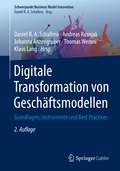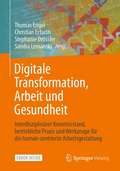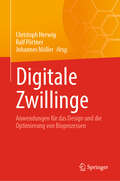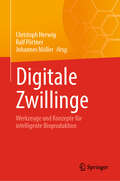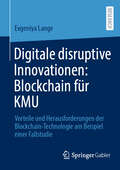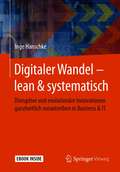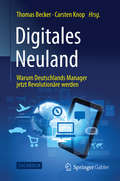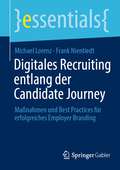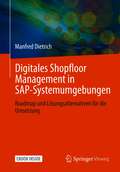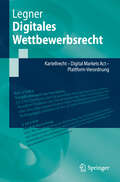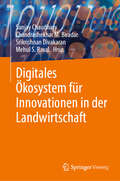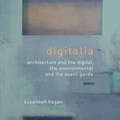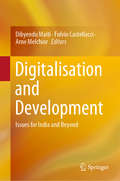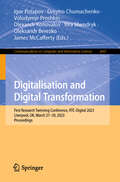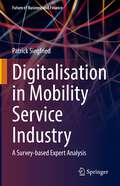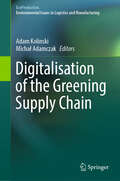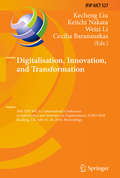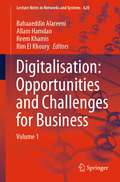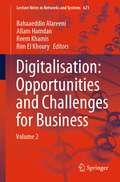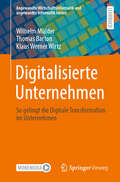- Table View
- List View
Digitale Transformation von Geschäftsmodellen: Grundlagen, Instrumente und Best Practices (Schwerpunkt Business Model Innovation)
by Daniel R. A. Schallmo Thomas Werani Andreas Rusnjak Johanna Anzengruber Klaus LangDieses Buch zeigt, wie es Unternehmen gelingt, ihre Geschäftsmodelle auf die digitale Zukunft vorzubereiten und wie dadurch Wettbewerbsvorteile geschaffen und Kundenanforderungen besser erfüllt werden können. Die Autoren aus Praxis und Wissenschaft zeigen die digitale Transformation von Unternehmen über die gesamte Wertschöpfungskette hinweg.Die Beiträge behandeln Ansätze und Instrumente, Studienergebnisse und Best Practices unterschiedlicher Industrien im Kontext der digitalen Transformation. Die Inhalte berücksichtigen divergierende Anforderungen von Unternehmen und Industrien und können nach Bedarf kombiniert und erweitert werden, um sie an die spezifischen Rahmenbedingungen eines Unternehmens anzupassen.Die zweite aktualisierte Auflage wurde überarbeitet und enthält neue wissenschaftliche und praktische Beiträge zu den folgenden drei zentralen Themen: Ansätze und Instrumente, Studienergebnisse sowie Best Practices aus den Bereichen Mobilität, Gesundheit, Maschinenbau, Medien, Lebensmittel, Banken und Handel.
Digitale Transformation, Arbeit und Gesundheit: Interdisziplinärer Kenntnisstand, betriebliche Praxis und Werkzeuge für die human-zentrierte Arbeitsgestaltung
by Thomas Engel Christian Erfurth Stephanie Drössler Sandra LemanskiDie digitale Transformation verändert die Arbeitswelt. Wie wird die Digitalisierung gesundheitsgerecht in kleinen und mittleren Unternehmen umgesetzt? Der aktuelle Wissensstand wird zusammengefasst, mit detaillierten Einblicken in die Praxis und Werkzeugen zur Bewältigung betrieblicher Digitalisierungsprojekte.
Digitale Werbung in der Post-Cookie-Ära: Gezielte Kampagnenplanung entlang der Customer Journey
by Alexander Schwarz-Musch Alexander Tauchhammer Bernhard GuetzDieses Buch erklärt, wie Unternehmen ihre Onlinekampagnen erfolgreich planen und umsetzen können – auch nach dem Ende der Third-Party-Cookies. Kampagnen auf Social-Media-Plattformen, in Suchmaschinen und mittels Display-Werbung können nach wie vor effektiv sein, wenn potenzielle Kund:innen gezielt angesprochen werden. Die Autoren zeigen, wie das auch ohne Cookies funktioniert: Die Entwicklung einer „Minimum Viable Persona“ und die Definition von Kampagnengruppen entlang der Customer Journey spielen dabei zentrale Rollen. Für jeden Touchpoint auf dem Weg zum Kaufabschluss müssen Etappenziele definiert werden, wodurch Effektivität und Effizienz der Maßnahmen leicht überprüft werden können.Ein Werk für Marketingverantwortliche, die nach Lösungen in der Post-Cookie-Ära suchen, um ihre Zielgruppen weiterhin ohne Streuverluste zu erreichen.
Digitale Zwillinge: Anwendungen für das Design und die Optimierung von Bioprozessen
by Ralf Pörtner Christoph Herwig Johannes MöllerDies ist der zweite von zwei Bänden, die zusammen einen Überblick über die neuesten Fortschritte bei der Erzeugung und Anwendung digitaler Zwillinge in der Bioprozessentwicklung und -optimierung geben. Bioprozesse haben sich in den letzten Jahrzehnten stark entwickelt, von datengetriebenen Ansätzen hin zur Digitalisierung der Bioprozessindustrie im 21. Jahrhundert. Darüber hinaus erfordert die hohe Nachfrage nach biotechnologischen Produkten effiziente Methoden, sowohl in der Forschung und Entwicklung als auch im Technologietransfer und in der Routineproduktion. Ein vielversprechendes Werkzeug ist in diesem Zusammenhang der Einsatz von digitalen Zwillingen als virtuelle Darstellung des Bioprozesses. Sie spiegeln die Mechanik des biologischen Systems, die Wechselwirkungen zwischen Prozessparametern, Kennzahlen und Produktqualitätsmerkmalen in Form eines mathematischen Prozessmodells wider. Darüber hinaus ermöglichen digitale Zwillinge den Einsatz computergestützter Methoden, um ein besseres Prozessverständnis zu erlangen, neuartige Bioprozesse zu testen und zu planen sowie diese effizient zu überwachen. Dieses Buch konzentriert sich auf die Anwendung digitaler Zwillinge in verschiedenen Kontexten, z.B. computergestützte Versuchsplanung, Seed-Train-Vorhersage und Lifeline-Analyse. Die beiden Bände behandeln sowohl die Grundlagen als auch die Anwendungen und bieten damit eine ideale Einführung in das Thema für Forscher und Entwickler in Wissenschaft und Industrie.
Digitale Zwillinge: Werkzeuge und Konzepte für intelligente Bioproduktion
by Ralf Pörtner Christoph Herwig Johannes MöllerDies ist der erste von zwei Bänden, die zusammen einen Überblick über die neuesten Fortschritte bei der Erzeugung und Anwendung digitaler Zwillinge in der Bioprozessentwicklung und -optimierung geben. Bioprozesse haben sich in den letzten Jahrzehnten stark entwickelt, von datengetriebenen Ansätzen hin zur Digitalisierung der Bioprozessindustrie im 21. Jahrhundert. Darüber hinaus erfordert die hohe Nachfrage nach biotechnologischen Produkten effiziente Methoden, sowohl in der Forschung und Entwicklung als auch im Technologietransfer und in der Routineproduktion. Ein vielversprechendes Werkzeug ist in diesem Zusammenhang der Einsatz von digitalen Zwillingen als virtuelle Darstellung des Bioprozesses. Sie spiegeln die Mechanik des biologischen Systems, die Wechselwirkungen zwischen Prozessparametern, Kennzahlen und Produktqualitätsmerkmalen in Form eines mathematischen Prozessmodells wider. Darüber hinaus ermöglichen digitale Zwillinge den Einsatz computergestützter Methoden, um ein besseres Prozessverständnis zu erlangen, neuartige Bioprozesse zu testen und zu planen sowie diese effizient zu überwachen. Dieses Buch erläutert die mathematische Struktur digitaler Zwillinge, ihre Entwicklung und die einzelnen Teile des Modells sowie Konzepte zur wissensbasierten Erzeugung und strukturellen Variabilität digitaler Zwillinge. Die beiden Bände decken sowohl Grundlagen als auch Anwendungen ab und bieten damit den idealen Einstieg in das Thema für Forscher und Entwickler in Wissenschaft und Industrie gleichermaßen.
Digitale disruptive Innovationen: Vorteile und Herausforderungen der Blockchain-Technologie am Beispiel einer Fallstudie
by Evgeniya LangeDieses Buch bietet eine fundierte und praxisorientierte Analyse der Blockchain-Technologie als digitale disruptive Business-Innovation im Kontext kleiner und mittlerer Unternehmen. Durch die Verbindung theoretischer Grundlagen mit einer empirischen Fallstudie im Bereich Dokumentenmanagement wird aufgezeigt, wie technologische Konzepte in betriebliche Anwendung überführt werden können. Der Fokus liegt auf strategischen Erfolgsfaktoren wie Akzeptanz, Ressourcenverfügbarkeit und organisationaler Einbettung. Die Analyse basiert auf einem internationalen Forschungsrahmen und bezieht aktuelle globale Studien und Entwicklungen systematisch ein. Damit liefert die Autorin wertvolle Impulse für Wissenschaft, Unternehmenspraxis und Politik im Spannungsfeld von Digitalisierung und Mittelstand.
Digitaler Wandel – lean & systematisch: Disruptive und evolutionäre Innovationen ganzheitlich vorantreiben in Business & IT
by Inge HanschkeDie digitale Transformation erfolgreich meistern:- Voraussetzungen schaffen und Business-Agilität enablen- Neue disruptive oder evolutionäre Geschäftsmodelle - Wettlauf um Produkte und Märkte von morgen gewinnenStarten Sie Schnellboote und fangen Sie diese geordnet ein!Gestalten Sie Ihre Organisation und Prozesse lean und digital; Nutzen Sie bewährte Best-Practices.Werden Sie zum Innovator, bauen Sie Ihr Business Eco-System auf und befähigen Sie Ihre Organisation für die Digitalisierung mit Hilfe der Best-Practices aus diesem Buch
Digitales China: Basiswissen und Inspirationen für Ihren Geschäftserfolg im Reich der Mitte
by Elena Gatti Christina RichterWer an Kunden in China verkaufen will, der muss die wohl digitalste Gesellschaft der Welt verstehen. Tauchen Sie mit diesem Buch in das China von heute ein und erfahren Sie, was den chinesischen Staat, seine Unternehmen und vor allem seine neuen Super-Konsumenten antreibt.Die Autorinnen begleiten Sie in ein Land der kreativen Ideen, in dem der Supermarkt zum Kunden kommt und das Smartphone alles erledigt. Lernen Sie, warum China der größte Mobile-Payment-Markt der Welt ist und wie Sie dieses Kaufverhalten für sich und Ihr Business nutzen können (und müssen). Sie lesen, was die großen Software-Unternehmen wie Baidu, Alibaba und Tencent (WeChat) auszeichnet und wie deren Tools Ihren Geschäftserfolg boosten können. Sie streifen durch Xiong'an, die neue Stadt mit dem digitalen Gehirn und erhalten Ideen, wie Sie als deutscher Einzelhändler oder Markenhersteller an Kunden in China oder an chinesische Touristen in Europa erfolgreich verkaufen können.Aus dem InhaltChinas digitale Welt: Alibaba, AliPay, Tencent, WeChat, WeChat Pay, QQ, u.v.m. Chinas Mobile E-Commerce und Mobile PaymentChinas Millennials – die neuen SuperkonsumentenWie „New Retail“ die Handelswelt verändern sollSmart Movement – von Connected Cars, Smart Shops und Smart CitiesMade in China 2025 – was sich ändern wirdDie neue Seidenstraße (one belt, one road)Dieses Buch entführt den Leser in den digital geprägten Alltag der Menschen und Unternehmen in China und macht so deutlich, was wir in Sachen Digitalisierung vom Reich der Mitte lernen können – und worauf Unternehmen vorbereitet sein müssen, wenn Sie dort verkaufen wollen.Während Deutschland noch in den Kinderschuhen der digitalen Transformation steckt, ist China bereits in der digitalen Zukunft angekommen. 75 Prozent der chinesischen Konsumenten kaufen online ein – am liebsten wird „mobil“ geshoppt, morgens auf dem Weg zur Arbeit oder abends auf dem Sofa. Bezahlt wird mehrheitlich mit dem Handy und das sogar auf dem lokalen Wochenmarkt: Tomaten, Gurken und Salat – alle haben einen eigenen QR-Code und ermöglichen so diese moderne Bezahlart. China ist wie ein eigenes Universum. Auch wenn sich das Land mehr und mehr dem Westen öffnet, vieles ist uns hierzulande nach wie vor unbekannt. Das ist schade, denn wir können von China mit Sicherheit einiges lernen – oder sogar kopieren. Zumindest, wenn es um Digitalisierung geht.
Digitales Marketing – Erfolgsmodelle aus der Praxis: Konzepte, Instrumente und Strategien im Kontext der Digitalisierung
by Meike TerstiegeDigital Marketing: Dieses Buch zeigt Ihnen, wie es funktioniertDieses praxisorientierte Buch bietet anhand von Best Practices einen umfassenden und branchenübergreifenden Überblick über den aktuellen Stand des Digital Marketings sowie über zukünftige Herausforderungen und Chancen. Denn nur Unternehmen, die im Zuge der Digitalisierung innovative Wege beschreiten, sind in der Lage, langfristig bestehende oder neue Zielgruppen zu gewinnen oder an sich zu binden. Im Bereich Sales und Marketing führt an neuen Medien und Instrumenten wie sozialen Netzwerken, Storytelling oder Thought Leadership kein Weg mehr vorbei. Daher klären die Autoren in diesem Werk zunächst grundlegende Fragen wie: Was ist Digital Marketing und wie kann man es nutzen? Anhand von Erfolgsgeschichten aus der Praxis leiten sie Handlungsempfehlungen für die digitale Marketingkommunikation ab. Im zweiten Teil liegt der Fokus auf der Praxis: Best-Practice-Beispiele zeigen, wie erfolgreiches Online- und Social-Media-Marketing konzipiert, umgesetzt und bewertet wird. So werden Konzepte und Strategien durch Anschauungsbeispiele verdeutlicht. Auf diese Weise liefert Ihnen dieses Digital-Marketing-Buch viele Ansätze und Impulse, die sowohl renommierte Unternehmen als auch Start-ups umsetzen können. Ein Leitfaden für Theorie und PraxisDurch seinen thematischen Schwerpunkt richtetet sich das Werk vorrangig an folgende Zielgruppen:Marketing- und Vertriebsexperten, welche die Möglichkeiten des Online-Marketings für ihr Unternehmen nutzen möchtenPraxisinteressierte Marketers aus der WissenschaftDozierende sowie Studierende der Betriebswirtschaft mit den Schwerpunkten Marketing, Management, Kommunikation, PR, Wirtschaftspsychologie oder SoziologieEine inhaltliche Mischung, die überzeugtInhaltlich geben Ihnen die Autoren in diesem Buch zunächst einen Überblick über den aktuellen Stand sowie die Herausforderungen des Digital Marketings. Einen umfassenden Schwerpunkt bilden im Anschluss Fallbeispiele sowie Case Studies aus dem Online-Marketing von verschiedenen Unternehmen und Agenturen. So wird mit Blick auf die Praxis deutlich, wie Konzerne Chancen des digitalen Marketings als Basis für ihre Erfolgsstrategien nutzen. Auf diese Weise überzeugt dieses Buch durch seine abwechslungsreiche Mischung aus Theorie und Praxis des Digital Marketings.
Digitales Neuland
by Thomas Becker Carsten KnopIndustrie 4. 0, die Digitalisierung und das Internet der Dinge (IoT) führen uns in Deutschland in die vierte industrielle Revolution. Wie sieht die Autobahn der Zukunft aus? Und wie die digitale Fabrik? Wo steht Deutschland im internationalen Vergleich und welche Chance und Risiken ergeben sich daraus? Dieses Buch liefert Antworten für alle, die wissen wollen, wie die Zukunft der deutschen Wirtschaft aussehen könnte. Vorstandsvorsitzende deutscher DAX30 Konzerne, Familienunternehmer, Wissenschaftler und Banken-CEOs gewähren in ihren Beiträgen Einblick in die jeweiligen Branchen und geben Empfehlungen zum Umgang mit der Industrie 4. 0.
Digitales Recruiting entlang der Candidate Journey: Maßnahmen und Best Practices für erfolgreiches Employer Branding (essentials)
by Michael Lorenz Frank NientiedtEmployer Branding und Social Recruiting werden in Zeiten des Fachkräftemangels zu einem zentralen Bestandteil der HR-Arbeit eines jeden Unternehmens. In diesem Essential stellen die Autoren Michael Lorenz und Frank Nientiedt relevante Kanäle und Maßnahmen für die ersten drei Candidate-Journey-Phasen (Anziehung, Information und Bewerbung) vor. Zahlreiche Praxistipps und sechs aktuelle Best Practices aus unterschiedlichen Branchen geben Anregungen für eine einfache Umsetzung im eigenen Unternehmen. Es zeigt sich: Eine positive Candidate Experience wird durch authentische Inhalte und mutige Ideen erzeugt, angepasst an die jeweiligen Zielgruppen. Gerade die jüngere Zielgruppe wird durch Kanäle wie TikTok, WhatsApp und Instagram erreicht. Zum Abschluss gibt HR-Experte Tim Verhoeven anhand von fünf Thesen einen Ausblick auf künftige Trends und die Auswirkungen des Arbeitskräftemangels und Beschleunigung der Digitalisierung.
Digitales Shopfloor Management in SAP-Systemumgebungen: Roadmap und Lösungsalternativen für die Umsetzung
by Manfred DietrichDieser Ratgeber zeigt Lösungsvarianten sowie Vorgehensmodelle auf und liefert einen schnellen Überblick, Entscheidungshilfen, praxisgerechte Hinweise, Erfahrungshintergrund aus Projekten und Expertenwissen für Ihre Digitalisierungsprojekte in der Fertigung. Erstellen Sie auf Grundlage dieses Buchs eine Roadmap mit den richtigen Prioritäten zur erfolgreichen Digitalisierung Ihrer Produktionsprozesse und verschaffen Sie sich damit Wettbewerbsvorteile in Ihrer Branche.
Digitales Tourismusmarketing: Grundlagen, Suchmaschinenmarketing, User-Experience-Design, Social-Media-Marketing und Mobile Marketing
by Eric HorsterDas Buch zeigt, wie digitale Strukturen und Prozesse erkannt und neue Technologien im Marketing bewertet und genutzt werden können. Neben Grundlagen zum digitalen Tourismusmarketing stehen Suchmaschinenmarketing, User-Experience-Design, Social-Media-Marketing sowie Mobile Marketing und die Verbindung von digitalen und realen Erlebniswelten im Fokus.Im ersten Teil des Buches werden die Besonderheiten des Internets herausgearbeitet und in die Customer Journey eingebunden, um den Prozess und die Struktur eines digitalen Tourismusmarketings ableiten zu können. Dadurch werden die Lesenden befähigt, die Bedingungen einzuschätzen, unter denen sich digitale touristische Marketingmaßnahmen abspielen. Im zweiten Teil werden Wege aufgezeigt, wie Websites für Suchmaschinen optimiert werden können und wie über Suchmaschinen Werbung geschaltet werden kann. Teil 3 zeigt, wie digitale Anwendungen im Hinblick auf deren User-Experience verglichen, analysiert und bewertet werden können. Ein besonderer Fokus wird auf Website-Optimierung und Relaunch-Prozesse gelegt. Im vierten Teil wird unter Zuhilfenahme zahlreicher Best-Practice-Beispiele der Einsatz verschiedener sozialer Netzwerke in Bezug auf unterschiedliche Marketingziele diskutiert und die verschiedenen Dienste und Netzwerke werden vorgestellt. Im fünften Teil werden technologische Trends beleuchtet, die sich auf das Mobile Marketing sowie den Einsatz von digitalen Endgeräten am Urlaubsort selbst beziehen. Dies wird insbesondere durch Beispiele von eher geschlossenen touristischen Räumen wie Festivals, Freizeitparks, Kreuzfahrtschiffen und Skigebieten erläutert. Das Buch schließt mit einem Ausblick auf mögliche zukünftige Entwicklungen im digitalen Tourismusmarketing.
Digitales Wettbewerbsrecht: Kartellrecht – Digital Markets Act – Plattform-Verordnung (Springer-Lehrbuch)
by Sarah LegnerDas Lehrbuch thematisiert den Wettbewerbsschutz auf digitalen Märkten. Zum einen erläutert es Grundlagen und sektorspezifische Vertiefungen zum europäischen und deutschen Kartellrecht. Zum anderen werden der Digital Markets Act und die Plattform-Verordnung dargestellt. Die Bewältigung wettbewerblicher Risiken auf digitalen Märkten ist ein dynamisches Thema, welches Gesetzgebung und Rechtsprechung in den letzten Jahren intensiv beschäftigt hat. Dies bietet Anlass, den aktuellen Acquis zum „digitalen Wettbewerbsrecht“ aufzuarbeiten und Studierenden in fortgeschrittenen Semestern sowie Praktiker:innen den Zugang zu der noch jungen, aber ausbildungs- und praxisrelevanten Rechtsmaterie zu erleichtern.
Digitales Ökosystem für Innovationen in der Landwirtschaft
by Sanjay Chaudhary Mehul S. Raval Chandrashekhar M. Biradar Srikrishnan DivakaranDieses Buch präsentiert die neuesten Erkenntnisse auf dem Gebiet des digitalen Ökosystems für Innovationen in der Landwirtschaft. Das Buch ist in zwei Abschnitte mit dreizehn Kapiteln unterteilt, die sich mit spezialisierten Bereichen befassen. Es gibt dem Leser einen Überblick über die Rahmenbedingungen und Technologien, die an der Digitalisierung der Landwirtschaft beteiligt sind, sowie über die Methoden zur Datenverarbeitung, Entscheidungsfindung und innovativen Dienste/Anwendungen zur Förderung digitaler Transformationen in der Landwirtschaft. Die Kapitel wurden von Experten verfasst, die ihre Erfahrungen in verständlicher Sprache durch Fallstudien, geeignete Illustrationen und Tabellen teilen. Der Inhalt wurde entwickelt, um die Bedürfnisse der Geoinformatik, Datenwissenschaften, Landwirtschafts- und Umweltwissenschaften von Universitäten, landwirtschaftlichen Universitäten, technologischen Universitäten, Forschungsinstituten und akademischen Hochschulen weltweit zu erfüllen.Es unterstützt Planer, politische Entscheidungsträger und Erweiterungswissenschaftler bei der Planung und nachhaltigen Bewirtschaftung von Landwirtschaft und natürlichen Ressourcen.
Digitalia: Architecture and the Digital, the Environmental and the Avant-Garde
by Susannah HaganSusannah Hagan boldly discusses the fraught relationship between key dominating areas of architectural discourse - digital design, environmental design, and avant-garde design.Digitalia firstly demonstrates that drawing such firm lines between architectural spheres is damaging and foolish, particularly as both environmental and avant-garde practices are experimenting with the digital, and secondly remonstrates with an avant-garde that has repudiated the social/ethical agenda of the modernist avant-garde because it failed the first time round. It is environmental architecture that has picked up the social/ethical ball and is running with it, using the digital to very different, and more far-reaching, ends.As the debates rage, this book is a key read for all who are involved or intrigued.
Digitalisation and Development: Issues for India and Beyond
by Fulvio Castellacci Arne Melchior Dibyendu MaitiThis book investigates the impact of information and communication technologies (ICTs) on development and well-being (beyond economic benefits) and highlights some emerging issues relating to the realities, constraints and digital divides with particular reference to India. It collects a series of novel contributions, studying the Indian experience in an international cross-country perspective. The book also discusses economic, social, and behavioural aspects of well-being as well as access to ICTs across regions, states and individuals to account for the digital divide. The book establishes an aggregate relationship between ICT exposure and well-being at the country level and addresses a number of fundamental issues, such as whether ICT raises the level of transparency and governance. Based on case studies and anecdotal evidence, it then further assesses the effective implementation of service delivery through ICT innovations. The book is divided into four parts: The introductory part surveys the literature and presents background information on the Indian case; introduces the main themes on the relationships between ICT, socio-economic development and digital divides; and provides a summary and roadmap to the chapters of the book. Part II focuses on the impact of ICT on economic performance, including economic growth, productivity and trade. Part III examines the extent of the digital divides in India, including international, regional as well as inter-personal inequality. Finally, Part IV investigates the impact of ICT on governance, users’ well-being and social outcomes. Combining insights from analyses of a variety of socio-economic dimensions related to digitalisation, this book is relevant for a wide range of scholars and researchers across disciplines, as well as practitioners and policy-makers. While the book has a main focus on India, various contributions take an international cross-country comparative perspective, and the results have general relevance for digitalisation and development. On the whole, the main message of this book is that the impact of ICTs is contingent upon other assets, capabilities and institutional conditions. National policies should, therefore, not only promote digitalization as such but also ensure its co-evolution and complementarity with a variety of other country-specific factors. Chapter 'Digitalisation and Development: Issues for India and Beyond' of this book is available open access under a CC BY 4.0 license at link.springer.com
Digitalisation and Digital Transformation: First Research Twinning Conference, RTC-Digital 2023, Liverpool, UK, March 27–30, 2023, Proceedings (Communications in Computer and Information Science #2647)
by Igor Potapov Vira Shendryk Dmytro Chumachenko Volodymyr Proshkin Oleksandr Berezko James McCafferty Olexandr KonovalovThis book CCIS 2647 constitutes the refereed proceedings of First Research Twinning Conference on Digitalisation and Digital Transformation, RTC-Digital 2023, held in Liverpool, UK, during March 27–30, 2023. The 29 full papers were carefully reviewed and selected from 101 submissions.The objective is to help Ukrainian academics at Universities and Research institutes to integrate into the international research network and to find new research contacts. In the long term, the high-quality research across the Digital Theme should drive the development of the Digital Infrastructure, Digital Economy and IT sector in Ukraine and support the recent OECD Policy Response "Digitalisation for recovery in Ukraine".
Digitalisation in Mobility Service Industry: A Survey-based Expert Analysis (Future of Business and Finance)
by Patrick SiegfriedThis book focuses on the implications of digitalisation in the mobility service industry. Based on an analysis of more than 450 survey responses, it explores and assesses mobility in the age of digitalisation. The content covers both changes in the relationship between the company and its customers and a potential paradigm shift among leading companies. The findings suggest that a shift from traditional mobility management to a more customer-centred management perspective is both widely accepted and increasingly necessary. Nevertheless, the inclusion of services that are not primarily concerned with overcoming spatial distances is considered to be less attractive. Given its scope, the book will be of interest to researchers and professionals who are involved in digitalisation in the mobility service industry.
Digitalisation of Global Business Services: Orchestrating the Enterprise Ecosystem (Technology, Work and Globalization)
by Albert Plugge Shahrokh NikouThe concept of Global Business Services (GBS) is well recognised and researched by both scholars and practitioners. However, the complexity of applying GBS has been the subject of various critiques due to its effect on firms’ business processes, service portfolio and provisioning of in-house as well as outsourced services. Although GBS results have been much criticised, this book argues that the rise of digitalisation reopens the question of implementing GBS successfully. The findings of this novel research, which is based on a multi-method approach, provide insights in relevant GBS factors and how these factors affect a GBS implementation strategy. Further analysis show how digitalisation, including platforms and AI, enable GBS organisations to decrease implementation issues. Research outcomes illustrate that firms which apply an enterprise ecosystem approach are better able to exchange GBS information. The willingness and ability of firms to intensify the collaboration at managerial and subject matter level will help to overcome GBS implementation challenges. This book puts forward the case that the rise of digitalisation enables GBS organisations to provide benefits and ensure that the GBS business model still matters. It will be of great interest to scholars and students of digital business and innovation.
Digitalisation of the Greening Supply Chain (EcoProduction)
by Adam Kolinski Michał AdamczakThis book includes in-depth discussions on practical aspects of digitalisation of a supply chains and covers a vary array of actionable digitisation tools. The academic literature points to a serious lack of precision in the scope that the digitalisation of business processes should address. Studies on the digitalisation of businesses have pointed to the fragmented nature of their coverage and the lack of a comprehensive approach to the research conducted in this area. Digital transformation is described in academic and specialist literature as the integration of digital technology into all areas of business, which in turn is causing fundamental changes in the way a company delivers its services and business activities, cultural changes and a change from traditional business processes to new, innovative practices and solutions that are having an impact on the greening supply chains. It is important to note that digital transformation involves the introduction of innovation and new business models, incorporating the computerisation of resources, supply chain visibility and increasing the use of technology to improve the experience of employees, customers, suppliers, partners and supply chain stakeholders. Digitisation is a business trend that is becoming increasingly important. Books on this subject that have been published in recent years deal with the issue on a fragmented basis. It is not possible to find a publication that comprehensively presents opportunities for the digitisation of supply chains through the computerisation and standardisation of information flows, the integration of IT systems in supply chains and the application of modern technologies and innovations. Only the synergy of these three aspects allows for the full digitalisation of greening supply chains. The book is an excellent material for both theoreticians and practitioners. Theoreticians will find inspiring research results in a very narrow thematic scope, which is also dynamically developing.
Digitalisation, Innovation, and Transformation: 18th IFIP WG 8.1 International Conference on Informatics and Semiotics in Organisations, ICISO 2018, Reading, UK, July 16-18, 2018, Proceedings (IFIP Advances in Information and Communication Technology #527)
by Kecheng Liu Keiichi Nakata Weizi Li Cecilia BaranauskasThis book constitutes the refereed proceedings of the 18th IFIP WG 8.1 International Conference on Informatics and Semiotics in Organisations, ICISO 2018, held in Reading, UK, in July 2018.The 30 full papers and 4 posters presented were carefully reviewed and selected from 38 submissions. The papers are organized in the following topical sections: organisational semiotics: theory and application; digital business ecosystems and value networks; socially aware knowledge engineering; and business intelligence and analytics.
Digitalisation: Volume 1 (Lecture Notes in Networks and Systems #620)
by Allam Hamdan Bahaaeddin Alareeni Reem Khamis Rim El KhouryThis book addresses the implications of technology, entrepreneurship, and business development gadgets for applications in societies. In this book proceedings, we attempt to address the importance and impact of digitalization and on business development in the context of economic diversity, that is through various propositions of modern technology and entrepreneurial actions, and through the lens of case studies, experiments, empirical assessments, just to name a few research methodological stances and approaches. This book highlights a range of topics in the fields of technology, entrepreneurship, business administration, accounting, and economics that can contribute to business development in developing countries, such as learning machines, artificial intelligence, big data, deep learning, game-based learning, management information system, accounting information system, knowledge management, entrepreneurship and social enterprise, corporate social responsibility and sustainability, business policy and strategic management, international management and organizations, organizational behavior and HRM, operations management and logistics research, controversial issues in management and organizations, turnaround, corporate entrepreneurship, and innovation, legal issues, business ethics, and firm governance, and firm financial affairs, non-traditional research, and creative methodologies. This book is ideal for academicians, activists, curriculum developers, researchers, professionals, administrators, and policymakers. The readers of this book could gain an up-to-date know-how on state-of-the-modern technology, entrepreneurship, and business development and achievements in this regard from the research standpoint of view.
Digitalisation: Volume 2 (Lecture Notes in Networks and Systems #621)
by Allam Hamdan Bahaaeddin Alareeni Reem Khamis Rim El KhouryThis book addresses the implications of technology, entrepreneurship, and business development gadgets for applications in societies. In this book proceedings, we attempt to address the importance and impact of digitalization and on business development in the context of economic diversity, that is through various propositions of modern technology and entrepreneurial actions, and through the lens of case studies, experiments, empirical assessments, just to name a few research methodological stances and approaches.This book highlights a range of topics in the fields of technology, entrepreneurship, business administration, accounting, and economics that can contribute to business development in developing countries, such as learning machines, artificial intelligence, big data, deep learning, game-based learning, management information system, accounting information system, knowledge management, entrepreneurship and social enterprise, corporate social responsibility and sustainability, business policy and strategic management, international management and organizations, organizational behavior and HRM, operations management and logistics research, controversial issues in management and organizations, turnaround, corporate entrepreneurship, and innovation, legal issues, business ethics, and firm governance, and firm financial affairs, non-traditional research, and creative methodologies.This book is ideal for academicians, activists, curriculum developers, researchers, professionals, administrators, and policymakers. The readers of this book could gain an up-to-date know-how on state-of-the-modern technology, entrepreneurship, and business development and achievements in this regard from the research standpoint of view.
Digitalisierte Unternehmen: So gelingt die Digitale Transformation im Unternehmen (Angewandte Wirtschaftsinformatik und angewandte Informatik lernen)
by Thomas Barton Wilhelm Mülder Klaus Werner WirtzDer Lesende erhält einen praxisbezogenen Einblick in Anwendungsfelder und Geschäftsmodelle eines digitalisierten Unternehmens. Methoden für die digitale Transformation werden erläutert. Die technischen Grundlagen und die betrieblichen Einsatzmöglichkeiten werden verständlich und anschaulich erklärt. Durch zahlreiche Fragen und Aufgaben sind Lernkontrollen möglich, somit eignet sich das Buch sehr gut als Begleitlektüre in Vorlesungen und zur Klausurvorbereitung.
